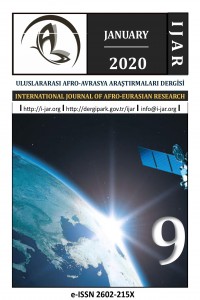Öz
Anahtar Kelimeler
Destekleyen Kurum
bartın üniversitesi
Kaynakça
- Akbaba, B. (2007). Atatürk ilkeleri ve inkılap tarihi dersinin amaçlarına yönelik öğrenci görüşleri. Kastamonu Eğitim Dergisi, 15(1):339-352.
- Doğaner, Y. (2005). Yükseköğretimde Atatürk ilke ve inkılap tarihi dersi öğretiminde karşılaşılan problemler ve yaklaşımlar. Atatürk Araştıma Merkezi Dergisi, 21(62):589-612.
- Dönmez, C. ve Hamarat, E. (2014). Atatürk Algısı Ölçeğinin geliştirilmesi: Geçerlik ve güvenilirlik çalışması. Elementary Education Online (İköğretim Online), 13(3):820‐6.
- Duman, N. (2018). Peri masalları ve çizgi animasyon filmlerindeki zihin durumlarının incelenmesi. (Doktora tezi). İstanbul Üniversitesi, İstanbul.Karasar, N. (2018). Bilimsel araştırma yöntemi kavramlar ilkeler teknikler. Ankara: Nobel.
- Köçer, M. ve Demir, S. (2009). Atatürk ilke ve inkılaplarına yönelik olarak geliştirilen tutum ölçeğinin geçerlilik ve güvenilirliği. Gazi Eğitim Fakültesi Dergisi, 29(3):877-887.
- Şahin, H. ve Ersevinç, M. (2007). Atatürk’ün Söylev ve Demeçleri. Ankara: Uludağ Üniversitesi Yayınları.
- Taş, F. ve Sanalan, A. (2004). Öğrencilerin Atatürk ilkeleri ve inkılâp tarihi dersini algılaması. Erzincan Eğitim Fakültesi Dergisi, 6(2):71-82.
- Yavuz, Ü. (1990). Atatürk İmparatorluktan Milli Devlete. Ankara:Türk Tarih Kurumu Basımevi.
Öz
After World War 1, Atatürk fought for the Turkish nation in the name of independence. He is a unique leader who established the Republic of Turkey
and made reforms in many areas to help country to achieve the level of contemporary civilizations. Following the founding of the Turkish
Republic, Atatürk gave significant tasks and responsibilities to the youth in the protection and supervision of this system. Therefore, the current
generation especially young people have an important role in the future of the Republic, From this point of view, the research focused on the level of
understanding of Atatürk's thought, system and actions. Because individuals who do not know what Atatürk did, cannot assimilate the
reforms made in accordance with the fundamental principles and cannot comprehend the Kemalist thought system cannot be expected to understand
the past, present and future properly. They are critical for the survival of the Turkish Republic and should be instructed to modern generations. In
this study, the perspective of the university students towards what Atatürk did and the effect of Atatürk's personality on the university students were
examined. For this purpose, “Atatürk Perception Scale” developed by Dönmez and Hamarat (2014) was applied to 45 university students aged
between of 18-24. Granting to the results of the research, students' perception of Atatürk is high with an average of 125.71 ± 20.12 points.
Perceptions of Atatürk, his reforms and his thoughts did not differ significantly according to gender and income level. The aim of the study is
to be the source of the researches to be conducted on the youth.
Anahtar Kelimeler
Kaynakça
- Akbaba, B. (2007). Atatürk ilkeleri ve inkılap tarihi dersinin amaçlarına yönelik öğrenci görüşleri. Kastamonu Eğitim Dergisi, 15(1):339-352.
- Doğaner, Y. (2005). Yükseköğretimde Atatürk ilke ve inkılap tarihi dersi öğretiminde karşılaşılan problemler ve yaklaşımlar. Atatürk Araştıma Merkezi Dergisi, 21(62):589-612.
- Dönmez, C. ve Hamarat, E. (2014). Atatürk Algısı Ölçeğinin geliştirilmesi: Geçerlik ve güvenilirlik çalışması. Elementary Education Online (İköğretim Online), 13(3):820‐6.
- Duman, N. (2018). Peri masalları ve çizgi animasyon filmlerindeki zihin durumlarının incelenmesi. (Doktora tezi). İstanbul Üniversitesi, İstanbul.Karasar, N. (2018). Bilimsel araştırma yöntemi kavramlar ilkeler teknikler. Ankara: Nobel.
- Köçer, M. ve Demir, S. (2009). Atatürk ilke ve inkılaplarına yönelik olarak geliştirilen tutum ölçeğinin geçerlilik ve güvenilirliği. Gazi Eğitim Fakültesi Dergisi, 29(3):877-887.
- Şahin, H. ve Ersevinç, M. (2007). Atatürk’ün Söylev ve Demeçleri. Ankara: Uludağ Üniversitesi Yayınları.
- Taş, F. ve Sanalan, A. (2004). Öğrencilerin Atatürk ilkeleri ve inkılâp tarihi dersini algılaması. Erzincan Eğitim Fakültesi Dergisi, 6(2):71-82.
- Yavuz, Ü. (1990). Atatürk İmparatorluktan Milli Devlete. Ankara:Türk Tarih Kurumu Basımevi.
Ayrıntılar
| Birincil Dil | Türkçe |
|---|---|
| Bölüm | Makaleler |
| Yazarlar | |
| Yayımlanma Tarihi | 30 Ocak 2020 |
| Yayımlandığı Sayı | Yıl 2020 Cilt: 5 Sayı: 9 |
All rights reserved. International Journal of Afro-Eurasian Research (IJAR) is an International refereed journal and published biannually. Authors are responsible for the content and linguistic of their articles. Articles published here could not be used without referring to the Journal. The opinions in the articles published belong to the authors only and do not reflect those of International Journal of Afro-Eurasian Research.


